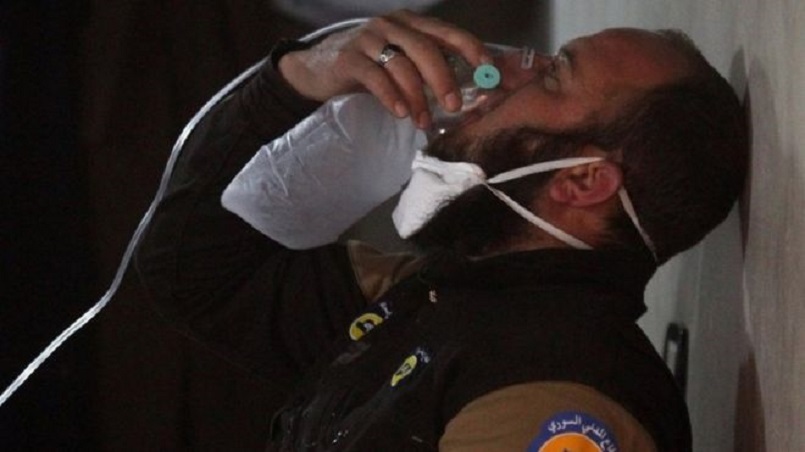
The search for a unified approach to the Syria conflict after last week's suspected chemical attack looks set to dominate talks between the G7 group of leading nations in Italy on Monday.
Foreign ministers will focus on how to pressure Russia to distance itself from Syrian President Bashar al-Assad.
Allies will also be seeking clarity from the US on its Syria policy, after some apparently mixed messages.
US Secretary of State Rex Tillerson strongly criticised Russia on Sunday.
He said that it had failed to prevent Syria from carrying out a chemical attack on the rebel-held town of Khan Sheikhoun last Wednesday which left 89 people dead.
But he also clarified there had been "no change to our military posture" in Syria following a retaliatory US strike against a Syrian airbase, and that Washington's "first priority" in Syria was to defeat so-called Islamic State (IS).
Those comments came a day after the US ambassador to the United Nations said there was no way to stabilise Syria with Mr Assad as president.
"In no way do we see peace in that area with Assad as the head of the Syrian government," Nikki Haley told NBC's Meet the Press.
However, she had said last week that Mr Assad's removal was no longer a US priority.
Ahead of the meeting of G7 foreign ministers in the city of Lucca, in Tuscany, on Monday, Mr Tillerson took part in an international wreath-laying ceremony to remember those killed in a Nazi massacre of villagers at Sant'Anna di Stazzema in 1944.
He drew a parallel to last week's chemical attack, saying: "We rededicate ourselves to holding to account any and all who commit crimes against the innocents anywhere in the world."
What are the options for pressuring Russia?
The next two days will be dominated by a collective search for arguments to persuade President Vladimir Putin he must now end Russia's military support for President Assad and help accelerate a negotiated political transition, BBC diplomatic correspondent James Robbins says.
UK Foreign Secretary Boris Johnson is expected to press the case for new sanctions against Russia if Moscow does not give ground. "It's time for Vladimir Putin to face the truth about the tyrant he is propping up," Mr Johnson said.
Russia is already under a raft of sanctions imposed by the US and EU in response to the annexation of Crimea and the crisis in eastern Ukraine. These target Russian individuals and businesses, and key sectors of the Russian economy closely connected to the ruling elite.
Mr Tillerson wants to go on from the G7 talks to Moscow on Tuesday, able to confront the Russians with a strong set of demands backed by key US allies.
The G7 groups Canada, France, Germany, Italy, Japan, the UK and the US, with the European Union also represented.
What is US policy on Syria?
The strike on the Shayrat airbase is the kind of direct intervention in Syria's six-year-old civil war that Donald Trump's predecessor, Barack Obama, had avoided.
As analyst PJ Crowley wrote in a recent BBC News article, Mr Obama chose to define America's vital interest in Syria narrowly, defeating IS without getting more deeply involved in another costly Middle East quagmire.
Until Friday's strike, so did Mr Trump. He opposed military action in 2013 and campaigned on a platform of fixing problems in the US, not Syria.
But while viewing the strike as decisive, most commentators are not seeing a radical change in the US approach to Syria.
White House sources were quick to dismiss any difference in nuance between Nikki Haley's comments and administration policy as "inadvertent and unintentional".
Meanwhile, Rex Tillerson's statement about "no change to our military posture" made it clear that Washington still regards the number one priority in Syria to be the elimination of IS.
Reuters news agency quoted one senior European diplomat as saying that the US was "navigating aimlessly in the dark" in the search for a transfer of power in Syria.
